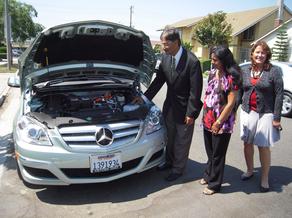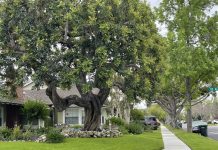Former Black Panther Aaron Dixon spoke at Cypress College on Thursday, Feb. 19. He held the floor for an hour and a half before opening up the room for questions. This Q & A session was followed by a book signing of his book, “My People are Rising: Memoir of a Black Panther Party Captain.”
Former Black Panther Aaron Dixon spoke at Cypress College on Thursday, Feb. 19. He held the floor for an hour and a half before opening up the room for questions. This Q & A session was followed by a book signing of his book, “My People are Rising: Memoir of a Black Panther Party Captain.”
Dixon founded the Seattle chapter of the Black Panther Party in the spring of 1968, shortly after Martin Luther King Jr. was assassinated. He and several other local activists thought other forms of rebellion and protection were necessary. He was 19 years old at the time and captain of the chapter.
The Humanities lecture hall was standing room only, and the full house was captivated from the introduction. “Black Power to black people, White Power to white people, Brown Power to brown people, Yellow Power to yellow people, Red Power to red people, All Power to the People,” said Dixon.
Mr. Dixon’s composed and powerful passion flowed through these words and was felt by many in attendance.
With the crowd on notice, Dixon began his lecture and sharing of history with his personal history. Born in segregated Chicago, his family moved to central Seattle when he was a young boy. This section of Seattle was very diverse; this newfound opportunity to socialize with different colored people was pivotal in his upbringing.
He spoke of the oral tradition that was much more prevalent during the 1950s and 1960s and the presence of a strong cultural value system. The sense of family and community were much stronger than today, he recalled. His parents preached social justice to all of their sons, which had a profound impact on his life.
Dixon also recounted his conversations with his great, great grandmother, who was a daughter of a former slave. These conversations along with his interactions with other cultures helped mold his societal curiosity, and helped build the courage of this renowned community and civil rights activist.
His personal anecdotes about the likes of prominent party members such as Huey P. Newton, Fred Hampton, Bobby Seale, Little Bobby Hutton, Eldridge Cleaver and many others, enthralled the audience who had been unfamiliar with these names and the stories associated with them.
Tales of necessary gun-toting, police standoffs, codes of conduct, governmental conspiracies against the Black Panther Party, and community goodwill were enlightening and thought provoking.
Dixon was instrumental in the creation of the Free Breakfast for Children program which fed over 10,000 children daily. In Seattle, he also founded a free medical and legal clinic for the impoverished community that still exists today as the Carolyn Downs Clinic.
After his departure from the Black Panther Party, just before the party’s dissolution, he continued his political activism. In 2006, Dixon was the Green Party’s nomination for U.S. Senate in the state of Washington. He lost the election to Democratic rival Maria Cantwell. This unsuccessful bid did not damage his conviction. He continues to fight for social justice today, though he does not foresee another run at public office.
His appearance on the college campus was informative and beneficial to those fortunate to have a seat during the standing room only lecture. His story is a tale of the times, which he convincingly connects to the present day and the days of his great, great grandmother. Dixon’s book, “My People are Rising: Memoir of a Black Panther Party Captain,” is available at your nearest bookstore and definitely available online for purchase.












